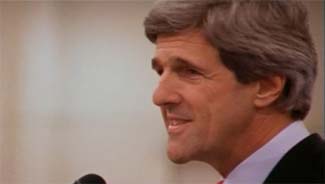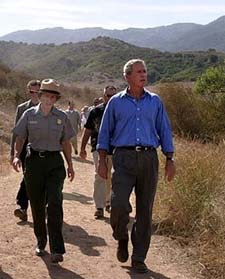
|
|
|
|
Bush and Kerry Clash on Science Environment News Service |
|
Both questionnaires were published Thursday. Bush defended his restrictions on stem-cell research, his focus on more research of climate change and his support for research of new nuclear weapons. On climate change, Bush acknowledged in his "Nature" response that it is "a serious long-term issue" but defended his focus on more research and voluntary U.S. greenhouse gas emissions reductions. The President noted there is "considerable uncertainty" about the impacts of natural climate fluctuations and the future impacts climate change will have on the Earth. In his response, Kerry criticized Bush for rejecting the Kyoto Protocol and "stubbornly walking away from the negotiating table altogether," instead sending to the Senate for ratification the international treaty limiting the emission of six greenhouse gases, which the United States signed during the Clinton administration. President Bush's refusal to support ratification has jeopardized the effectiveness of the protocol, which now may not enter into force unless it is ratified by Russia. Kerry says he would re-engage the international community and favors "setting concrete limits to halt and reverse the growth in global warming pollution and tapping the ingenuity of American industry." Bush declined to respond to a question from "Science" on whether he would support a cap and trade program for greenhouse gas emissions. Kerry indicated he supports the concept. Kerry blasted the President's position on stem-cell research - one of the few scientific issues that have gained some traction during the campaign. The President has limited federal funding to research on stem cell lines that were created prior to August 9, 2001. Kerry called that policy "ideologically driven" and pledged to overturn it. The President defended this policy primarily on moral terms and said in his "Nature" response that it reflects his commitment to "pursuing stem-cell research without crossing a fundamental moral line."
On nuclear weapons, Bush's answer did not openly address his support for research into new weapons, in particular low-yield and "bunker buster" nukes. Critics contend the move undermines U.S. efforts to slow the proliferation of nuclear weapons. Bush noted a 2002 report that found the U.S. nuclear infrastructure "had atrophied since the end of the cold war and that the evolving security environment requires a flexible and responsive weapons-complex infrastructure." Kerry said he would "end the pursuit of a new generation of nuclear weapons." Bush told "Science" his top three priorities in science and technology are: ensuring every American has access to affordable broadband by 2007; next-generation hydrogen research; and recruiting science and technology to fight terrorism. Kerry outlined three broad priorities - restoring "preeminence of American science and technology;" expanding scientific education; and ensuring that his decisions are informed by the "best possible science and technology advice." Both candidates expressed support for the work of the U.S. Oceans Commission in response to a question by "Science," but neither candidate would commit to the commission's recommendation to create a high-level oceans policy panel in the White House or to a proposed doubling of funds for ocean research over 5 years. On space exploration, the President is keen to move forward with his plan to send astronauts back to the Moon by 2020 and use the mission as a foundation for human missions "beyond the Moon." Kerry did not directly support or oppose Bush's plan, but questioned "lofty goals" that are not supported with "realistic funding." With regards to the Endangered Species Act, Bush reiterated his desire to "modernize" the law, which he says has been undermined by excessive litigation. Voluntary partnerships and private conservation agreements "provide far greater conservation benefits while avoiding unnecessary regulatory, economic and social burdens," Bush said. The Bush administration's Endangered Species Act policies have infuriated many environmentalists, but Kerry did not openly criticize the President on this issue. He said he supports the goals of the law and would continue "America's strong legacy of protecting wildlife." In response to a question on biotech crops, Bush expressed satisfaction with current regulation and added "it is important that the regulatory framework keeps pace with the science." Kerry did not mention specific concerns, but said he would work internationally and domestically to "make sure biotechnology is safe for human consumption and for the environment." The President touted his controversial "Clear Skies" air pollution plan in response to a question on energy by "Science" and said he is committed to investing more than $2 billion over 10 years in clean coal technology. Kerry echoed Bush's support for clean coal and said he would invest more in renewable technologies. "Nature" selected 15 questions for the questionnaire from about 50 submitted by its editorial staff. The President and his main challenger were each asked to keep their responses to 1,500 words - Bush's answers were "some 30 percent over length" and were edited by the journal. Kerry's answers fit the requested limits and were not trimmed. "Science" asked the candidates 20 questions on a dozen issues and published their answers unedited. The "Nature" questionnaire can be found here and the "Science" survey is available here. Copyright by Environment News Service, 2004 ENS |
|
 Democratic presidential contender John Kerry answered questions about his proposed environmental policies from Nature and Science magazines
Democratic presidential contender John Kerry answered questions about his proposed environmental policies from Nature and Science magazines  Bush continued to distance himself from the stem-cell research issue saying the science's healing power should not be 'overstated'
Bush continued to distance himself from the stem-cell research issue saying the science's healing power should not be 'overstated'